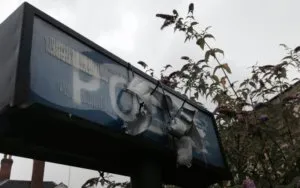
The case has once again frustrated hate crime campaigners, who say it highlights the need for better training throughout the criminal justice system, and for more effective legislation.
Craig Kinsella, who has learning difficulties, was kept as a slave in a garage in “squalid” conditions by a Sheffield family, beaten on a daily basis for more than five weeks, and forced to work and scavenge for food.
Nearly three weeks after the sentencing of three members of the family for offences against Kinsella, Disability News Service (DNS) is gradually piecing together the reasons why the offences were not treated as hate crime when the family were sentenced, and is building a picture of confusion and disagreement across the justice system.
South Yorkshire police has confirmed that it never treated the offences against Kinsella as disability hate crime, and insisted that there was “no evidence to suggest the victim had a learning disability”.
But the court heard during the sentencing hearing earlier this month that Kinsella had learning difficulties.
And a CPS spokesman said that one of its lawyers flagged the case as a disability hate crime after examining the file of evidence presented by the police.
CPS then instructed David Brooke, who prosecuted the case in court, to ask the judge for higher sentences, on the basis that the offences were disability hate crime, under section 146 of the Criminal Justice Act 2003.
But when the sentencing hearing took place, Brooke did not follow these instructions, and failed to request the sentence uplift, although it is not yet clear why this happened.
A CPS spokesman admitted that there were “lessons to be learned” from the case.
He told DNS: “We have received a full report from counsel and will look into our procedures to ensure we are satisfied that there are clear lines of communication between counsel and those instructing in future and will be reminding all staff in CPS Yorkshire and Humberside of the importance of section 146.”
He added: “In general, counsel should follow their brief. We thought section 146 applied because of the hostility towards the victim. That was based on perceived disability.”
Brooke has failed to respond to a request for a comment by DNS.
Anne Novis, a coordinator of the Disability Hate Crime Network (DHCN) and a member of the Metropolitan police’s hate crime diamond group – which advises the force’s lead officer on hate crime – said she believed the Kinsella case proves yet again the need for stronger legislation.
She said: “Section 146 is a limited piece of legislation. It is not well-known by judges and not well-used by barristers. There is a need for something better.”
She said that public sector funding cuts had had a serious impact on the police.
“A local neighbourhood police officer told me that they will not even investigate an offence unless they know they will get a result because they are so stretched, but it is not just hate crime, it is all sorts of crime locally.”
But she said she believed that disability hate crime was now “on the police’s lips”, whereas 12 years ago “they wouldn’t even talk about it”.
She said: “There is progress, but we still need better legislation, something that the barristers, magistrates and judges have to apply, not something they can choose to apply.
“I feel like tearing my hair out at times and I feel like a stuck record, repeating myself for so many years.
“It is very disheartening but we can’t not keep on about it, because it’s people’s lives [that are at stake].”
Katharine Quarmby, another DHCN coordinator and author of Scapegoat, a ground-breaking investigation into disability hate crime, said anecdotal evidence suggested that specialist hate crime posts in the police had been lost due to funding cuts.
She said there was a sense that the progress that had been made in raising awareness of disability hate crime was “starting to crumble”.
She said: “We have lost our way and all that hard work is being lost. Case after case after case of really violent crimes are not making it through as hate crimes. There is always some excuse.”
And she said she feared that judges “do not believe in disability hate crime”.
“We are coming across the same barriers we saw in 2007-08 [when she began campaigning on hate crime]. It seems as if we never did that work.”
30 January 2014

 Disabled people receiving care were ‘ignored by design’ during the pandemic, Covid inquiry hears
Disabled people receiving care were ‘ignored by design’ during the pandemic, Covid inquiry hears Absence of disabled people’s voices from assisted dying bill has been ‘astonishing’, says disabled MP
Absence of disabled people’s voices from assisted dying bill has been ‘astonishing’, says disabled MP Ministers are considering further extension to disability hate crime laws, after pledge on ‘aggravated’ offences
Ministers are considering further extension to disability hate crime laws, after pledge on ‘aggravated’ offences